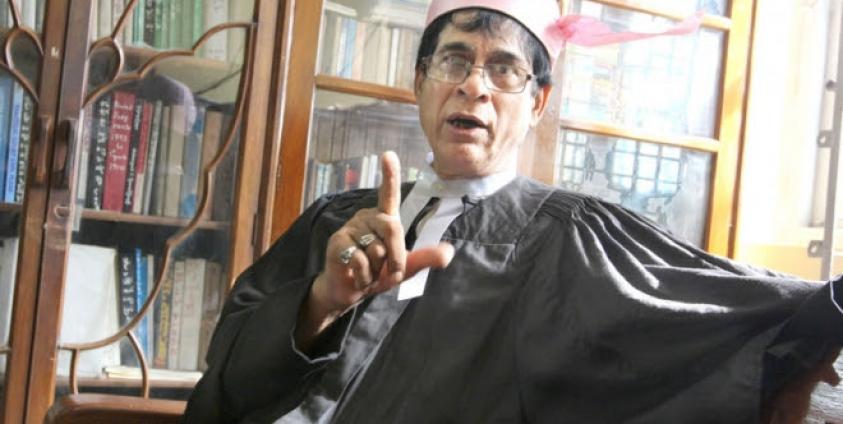Unity 5 lawyer Robert Sann Aung
As an activist U Robert Sann Aung has seen many jails from the inside. His opposition to the former military regime landed him ten years in the “black house”. He began practising law in 1981 but his licence was revoked in 1993 and it was another nineteen years, until July 9, 2012, before he was allowed to practise again. U Robert Sann Aung has since appeared in more than 60 cases, most of which have been political, with the most prominent being the case against four journalists and the chief executive officer of Unity Journal.
What was your first case after your licence was reinstated in 2012?
The Letpadaung copper mine case. I represented twenty of the protesters who where rounded up by the police. Finally they got off with a 10,000 kyats fine. The sixty cases I have pleaded in since have been mostly focussed on the 2011 Peaceful Demonstration Law, section 2, Defamation. Interesting also are sections 22 and 5; they contradict each other. I didn’t win any of the law suits concerning these sections, though.
Why was that?
Courts are still not independent. In that sense not much has changed. The executive branch of government still decides which sentence the judiciary is handing down. It is very difficult to change this. The current government might have changed clothes since the army days, but the mindset is still the same.
What are your expectations for the general election due late next year? Could it result in a more democratic government?
I don’t think so. The by-elections were cancelled. It is quite possible the elections will be postponed. They will claim they need more time to implement the proportional representation voting system. Personally, I think this system is not suitable for Myanmar. It might give fundamentalist Muslim and Buddhist groups a foothold in parliament.
Do you attract the attention of the authorities when you’re appearing in sensitive cases?
Yes, it happens. When I travel outside of Yangon I get followed around frequently by the Special Branch and the Sa Ya Pha, military intelligence. They’re on my tail 24 hours a day. They will ask hotels specifics about my stay and why they are accepting me. It has happened that hotels ask me to leave. It probably has to do with the politically flavoured cases I do. The authorities don’t like me very much.
Are you afraid that you might be jailed again?
I already served ten years jail. I know all these prisons: Mandalay, Insein, Tha Ya Wady, Monywa and Kalay prison, the “black house”. Nowadays my house is a “white house”, a liberated area, ha ha.
What is your opinion of the government’s recent decision to release more than 3,000 prisoners?
Only one of the released was a political prisoner. Most of them were criminals, with some former Military Intelligence officers being among them, some very senior. They are not political prisoners. I think currently there are about 400 to 500 political prisoners left in Myanmar, if you count farmers who had their land confiscated and protested as well.
Do you get paid for your work?
All of my political cases – the bulk of what I do – are pro bono. I only get paid for some criminal and civil cases. It’s difficult to get by.
One of the criminal cases involves the Unity 5. They were arrested over a report that chemical weapons were being made at a military facility in Magway Region, a claim denied by the government. The charges against the Unity 5 included breaching the 1923 Official Secrets Act and they were sentenced to 10 years in prison with hard labour. Can you update us on this case?
Originally the case was handled by Pakkoku District Court. They handed down the original sentence. I got the sentence reduced to seven years in prison when I appealed to the Magway High Court. Now I have submitted my second appeal, case 666(B)/2014, to the Supreme Court. In the last week of November the Supreme Court will decide if they accept my second appeal. If not, the case ends. If the case is accepted I get 45 days to prepare my final argument.
Do you think the sentence will be overturned?
I think the highest powers in government want the Unity 5 in jail. The chemical weapons facility they reported on is very sensitive to them. The new Minister of Information, U Ye Htut seems very friendly, but he dislikes journalists. I think during the 2012 by-election most of the journalists were rooting for the National League for Democracy and Daw Aung San Suu Kyi. So those in power now are still very angry with the journalists. In the end U Ye Htut is only a small player. There are other powers at play in the Unity 5 case, so the minister keeps quiet.



